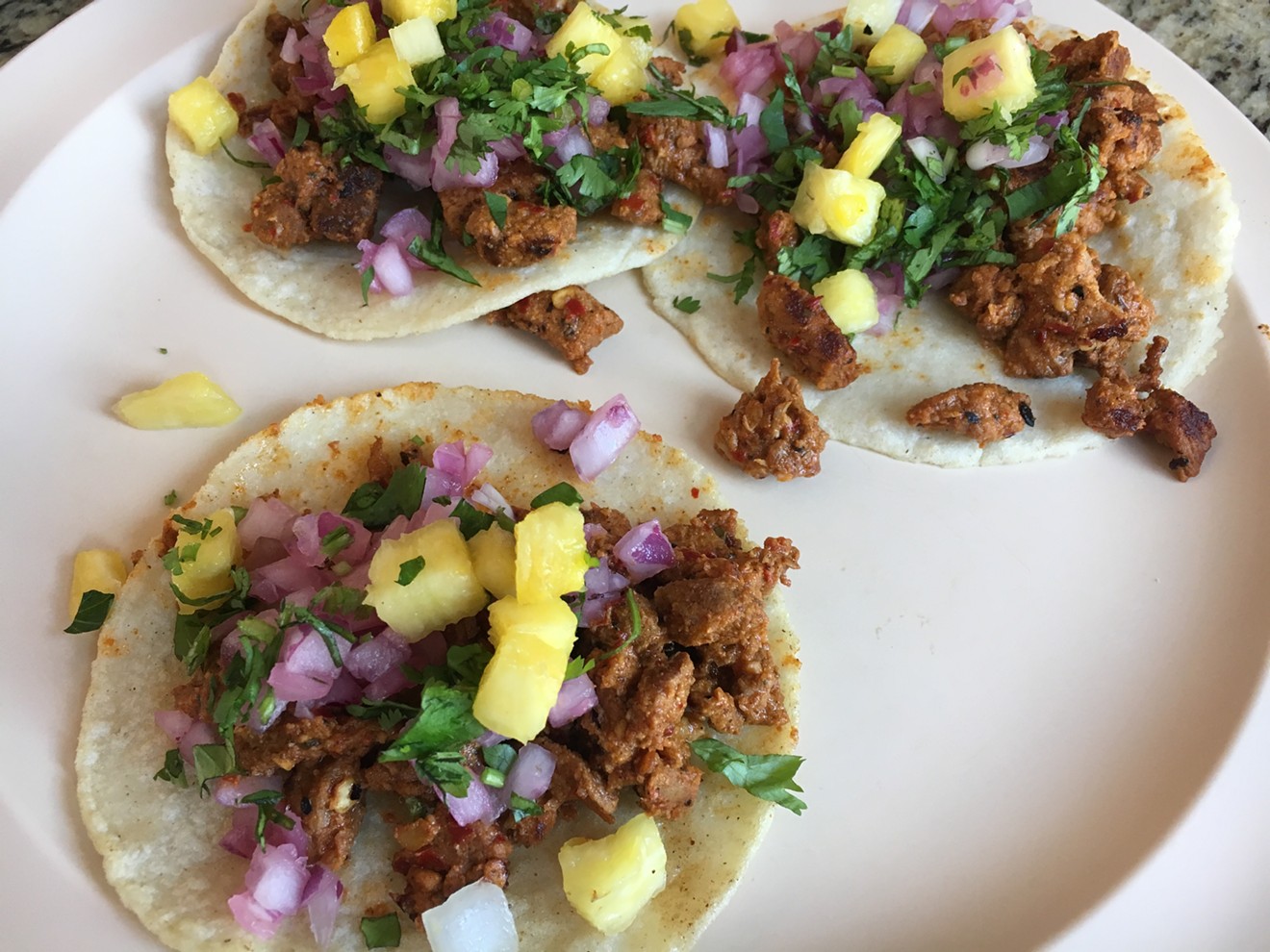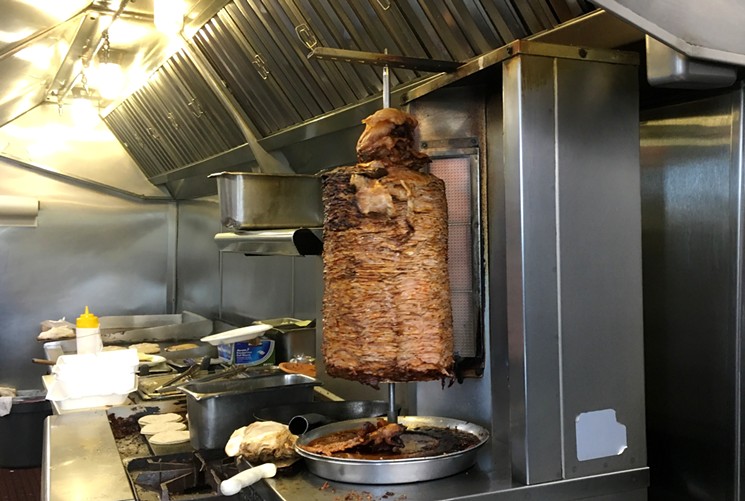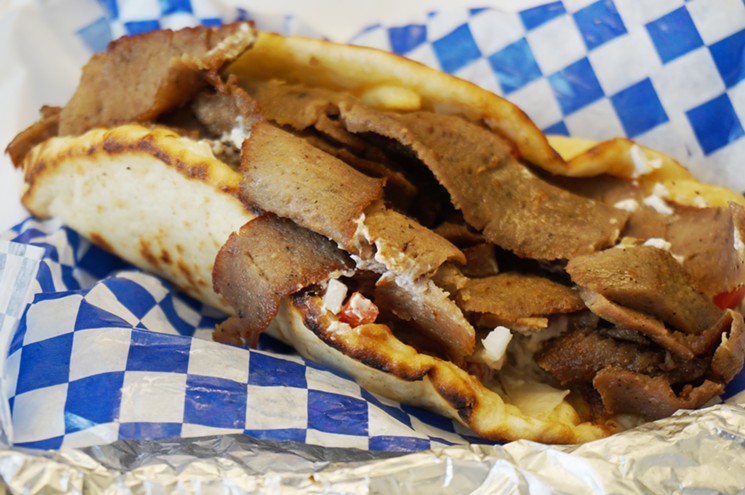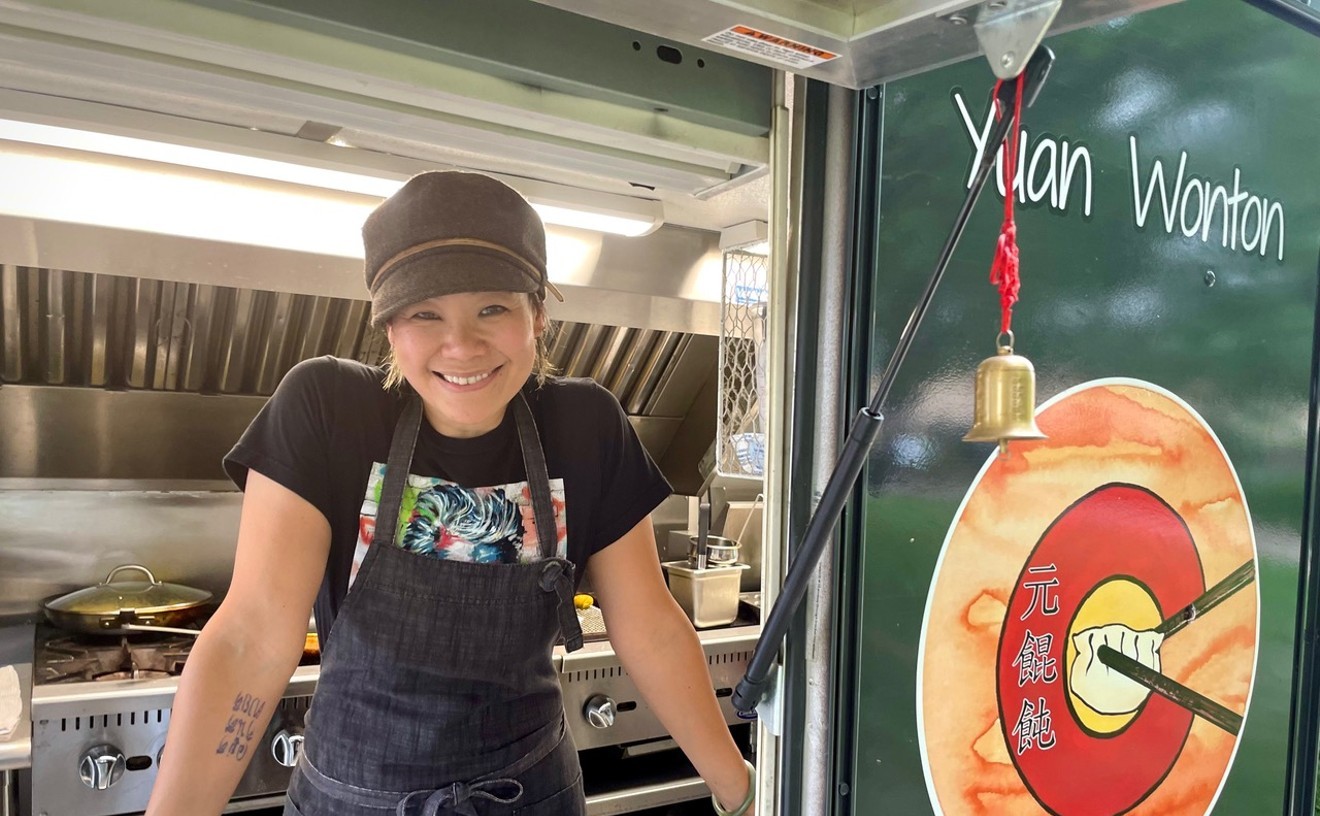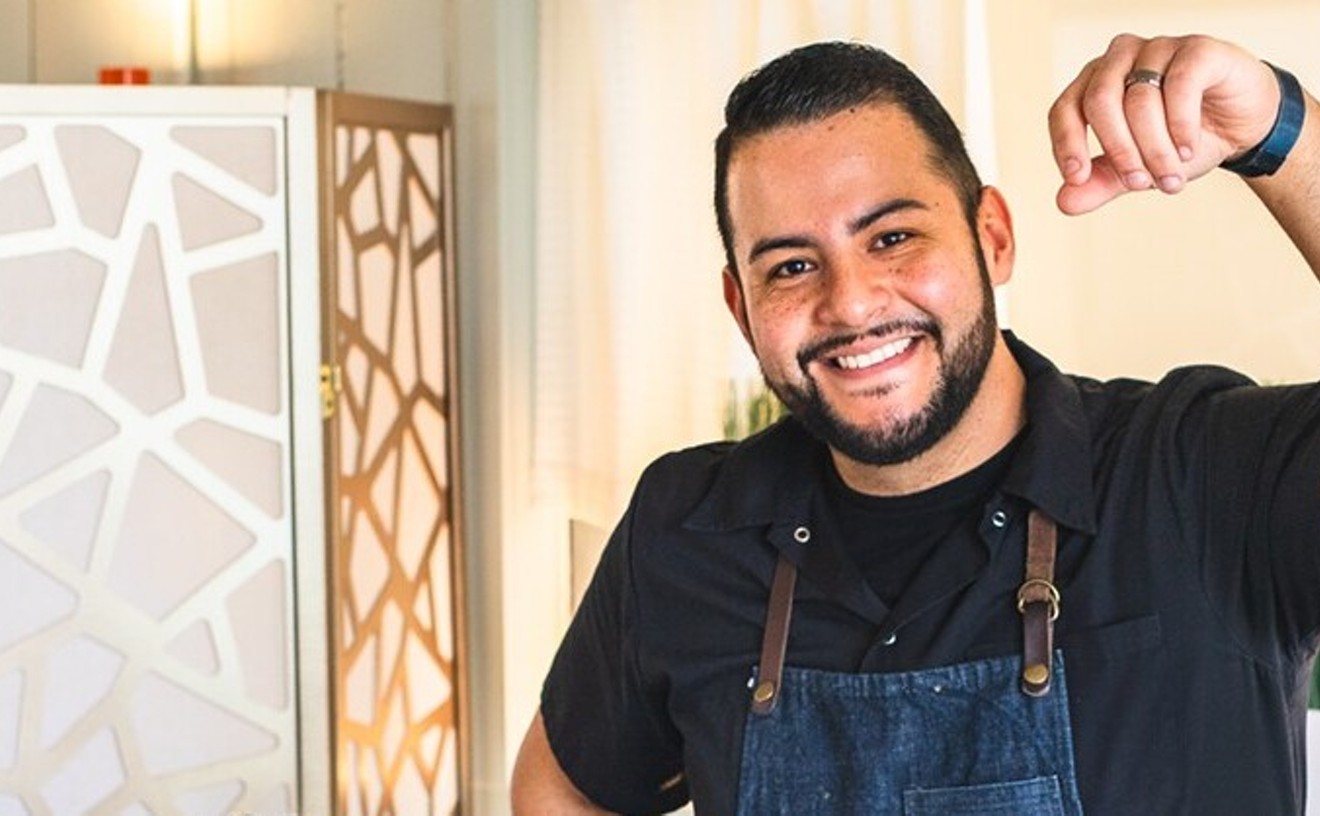For meat lovers, carne al pastor is an object of beauty. A vertical cone of marinated pork — usually shoulder sliced thin and stacked on a skewer — spins slowly in front of a red-hot burner; a pineapple or an onion (or sometimes a chunk of pork fat) skewered at the top weeps tears of joy that streak the cone with a mahogany patina as the juices caramelize. Then, when the outer layer is perfectly crisp and sizzling, the taquero brandishes a machete-sized knife and carves thin shavings of pork that fall into a tortilla waiting in his other hand. A couple more quick swipes of the knife add a shower of pineapple — and your taco is ready.
At least, that’s the way it’s worked for generations of taco stands in Mexico City and other towns where tacos al pastor are popular. Similar beef and lamb rigs employ the same cooking method in food stalls along the Mediterranean, where the meat is called gyros, doner or shawarma, depending on the country you’re in.
The process relies on a steady stream of customers so that as the raw meat at the center of the cone cooks, the meat on the outer layers is shaved away, never sitting too long, thus guaranteeing a safe and healthy meal. But in some settings — say, a restaurant with many other items on the menu or a taqueria that does a brisk business on Saturday nights but is almost empty during weekday lunch — a twenty-pound tower of raw meat sitting at room temperature for hours doesn’t conform to our modern notions of food safety (based on scientific evidence, not mere squeamishness). While most restaurant owners and cooks understand that meat held between 41 and 135 degrees Fahrenheit for very long will probably result in contaminated product, the need to sell food sometimes outweighs stringent adherence to food-handling guidelines.
That’s where health inspectors come in. With pastor and similar spit-roasted meats, what once worked on the busy streets of the city where a dish originated may not meet current safety practices in another city. With vertical broilers, as the Denver Department of Environmental Health designates the equipment used for pastor and gyros, previous rules stipulated that the meat had to be roasted and then finished on a griddle or hot pan to ensure that it was served at a safe temperature. (That extra step was bemoaned by pastor purists, who claimed that the additional cooking dried out the meat and muddled the roasted flavor gained by the traditional method.)
But a couple of years ago, the DEH devised a new set of regulations that had the potential to kill off vertical roasting in many kitchens around town. “It has to do with time control as well as temperature control,” explains Grace Nelson, a supervisor in the food program for the Public Health Inspections division. “Once they place the cone, it has to remain on the roaster and be continuously rotating.” And after the meat is shaved off the cone, it must be held at 135 degrees or above, or chilled to 41 degrees or below relatively quickly (within six hours). As long as the meat being sliced is completely cooked, no further time on the griddle or pan is needed, but any slices that are undercooked must be further cooked, and undercooked slices can’t be stored and reused with cooked slices. That last rule is good news for pastor fans: A seasoned taquero would never slice into raw meat — and a well-maintained trompo, as the pastor cone is called, will always have a thick layer that is above the 155 degrees required for beef and pork (chicken, as shawarma is sometimes made with, must hit 165). Under current Denver regulations, the entire trompo must be cooked and served — or cooked and properly stored — within four hours; any remainder after that time must be discarded.
Since restaurants are generally only inspected once a year in Denver (those that have previous violations may be visited more often), the effect of the changing pastor rules have taken some time to ripple out, and restaurants are taking varied approaches to keeping the food safe while still serving a quality product.
At North County in the Lowry neighborhood, chef/proprietor Sterling Robinson reduced the size of his pastor cones so that they would cook more quickly. “I think we may have been on the early side of this,” Robinson says. “About a year ago, the health department told us we had to change how we do pastor because of heating up to temperature in a certain period of time and then holding at a certain temperature. How we do it is we cook two smaller pastors — one in the morning and one in the afternoon — and we cook the meat all the way to 165 in this time. We then cut the meat off the stick and hold [it] above temperature.” Modern kitchen equipment that controls moisture levels as well as temperature allows the meat to be held at a perfect serving temperature without getting dried out, so the result at North County maintains a nice texture despite not being carved directly from the sizzling spit onto the customer’s plate.
Like North County, Los Carboncitos, the Leon family’s longtime taqueria at 3757 Pecos Street, cooks and carves an entire trompo before lunch service and then heats the pork on the grill before serving it. The slightly charred flavor of the exterior carries through in each bite beneath the zingy marinade — evidence of slow roasting. Despite the rule changes, the tacos al pastor here are as good as ever.
Some of the town’s finest tacos al pastor are served at Acapulco Tacos y Pupusas, a combination Mexican/Salvadoran shack at 8890 East Colfax Avenue, only a tortilla’s toss from the Aurora border. Inside the gleaming stainless-steel kitchen, barely bigger than a food truck, the trompo spins and the fat sizzles and spits throughout the day; pastor is one of the top sellers, ensuring that each hefty cone is sold out well before its four-hour time limit expires. Gaze in awe if you must, but don’t take too long or you’ll obstruct the continuous flow of taco seekers who crowd the tiny waiting room — hardly a dining room, with only three or four stools and a counter facing the busy thoroughfare outside.
Mexican restaurants aren’t the only spots adjusting to the new rules for spit-roasted meets. We stopped by Gyroz, 880 East Colfax Avenue, to see how this spot’s namesake (but for the jaunty “z” standing in for the “s”) meat was being handled. Most gyros cones come prefabricated and precooked as a blend of beef, lamb and spices, so the rules are a little different: As long as the exterior is cooked to 135 degrees, the meat is safe to serve, but the overall cooking time and storage of already cooked slices is the same as for raw, marinated pastor. Gyroz relies on sheer volume to ensure safety; after a busy weekday lunch, one employee told us that the shop goes through at least ten twenty-pound gyros cones a day, keeping well under the four-hour limit for each cone. At the height of a lunch or late-night crush, Gyroz has two spits going at once so that the exterior layer of one cone can cook through while the other is being shaved.
While pastor cones have disappeared from a few small operators that don’t have the volume to keep a spit going continuously or lack the equipment to store the cooked meat hot or chill it quickly, Denver’s best pastor trompos are still spinning — and you’ll definitely want to line up for a taste of this traditional Mexican street food.
Extinction may not be inevitable in this new trompo administration, but evolution is.
[
{
"name": "Air - MediumRectangle - Inline Content - Mobile Display Size",
"component": "12017618",
"insertPoint": "2",
"requiredCountToDisplay": "2"
},{
"name": "Editor Picks",
"component": "17242653",
"insertPoint": "4",
"requiredCountToDisplay": "1"
},{
"name": "Inline Links",
"component": "18838239",
"insertPoint": "8th",
"startingPoint": 8,
"requiredCountToDisplay": "7",
"maxInsertions": 25
},{
"name": "Air - MediumRectangle - Combo - Inline Content",
"component": "17261320",
"insertPoint": "8th",
"startingPoint": 8,
"requiredCountToDisplay": "7",
"maxInsertions": 25
},{
"name": "Inline Links",
"component": "18838239",
"insertPoint": "8th",
"startingPoint": 12,
"requiredCountToDisplay": "11",
"maxInsertions": 25
},{
"name": "Air - Leaderboard Tower - Combo - Inline Content",
"component": "17261321",
"insertPoint": "8th",
"startingPoint": 12,
"requiredCountToDisplay": "11",
"maxInsertions": 25
}
]

